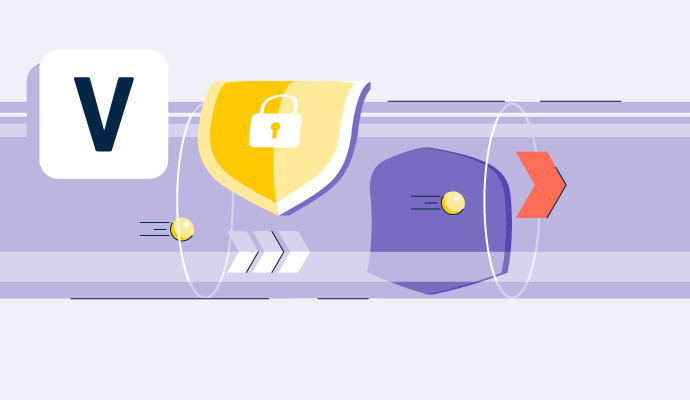Was ist ein virtuelles privates Netzwerk?
Ein virtuelles privates Netzwerk (VPN) ist ein Dienst, der eine verschlüsselte Verbindung von einem Gerät zu einem Netzwerk über das Internet bereitstellt. VPNs verschleiern die Online-Identität eines Nutzers, was es Dritten erschwert, Online-Aktivitäten zu verfolgen und Daten zu stehlen. Während sie häufig in Unternehmensnetzwerken verwendet werden, sind sie auch nützlich, um persönliche Informationen in öffentlichen WLAN-Umgebungen zu schützen.
Virtuelle private Netzwerke werden hauptsächlich von Unternehmen genutzt und ermöglichen die Datenübertragung. Unternehmen verwenden Software für virtuelle private Netzwerke, um Mitarbeitern sicheren, verschlüsselten und entfernten Zugang zum internen Netzwerk des Unternehmens zu bieten.
Diese Software ermöglicht es Mitarbeitern, auf Anwendungen, Dateien, Drucker und andere Unternehmensressourcen im Unternehmensnetzwerk zuzugreifen, als wären sie physisch im Büro. Durch die Anwendung starker Verschlüsselung auf den gesamten ein- und ausgehenden Datenverkehr wird sichergestellt, dass keine Dritten auf vertrauliche Informationen zugreifen können.
Arten von virtuellen privaten Netzwerken
Es gibt viele verschiedene Arten von virtuellen privaten Netzwerken. Die beiden Haupttypen sind jedoch:
- Remote-Access-VPN ist Computer-zu-Netzwerk. Es ermöglicht Nutzern, sich von überall mit dem Firmennetzwerk zu verbinden, was die Arbeit aus der Ferne sicherer und zugänglicher macht. Diese Art von VPN ist ideal für den persönlichen Gebrauch; jedoch kann es für größere Unternehmen ungeeignet sein.
- Site-to-Site-VPN wird häufig von Unternehmen genutzt, insbesondere von großen Unternehmen mit mehreren Niederlassungen. Die Verwendung von Site-to-Site-VPNs zur Verbindung von Unternehmensbüros mit Zweigstellen ist der effektivste Weg, um sichere Kommunikation innerhalb und zwischen großen Abteilungen zu gewährleisten. Mehrere Nutzer an verschiedenen Standorten können auf die Ressourcen der anderen zugreifen.
Wie funktioniert ein virtuelles privates Netzwerk?
Ein VPN verbirgt Benutzer-IP-Adressen, indem es sie über einen speziell konfigurierten Remote-Server umleitet, der von einem VPN-Host betrieben wird. Da der Datenverkehr zwischen dem Gerät und dem Netzwerk verschlüsselt ist, können der Internetdienstanbieter (ISP) und andere Dritte nicht sehen, welche Daten ein Nutzer sendet und empfängt – sie bleiben privat.
VPNs ermöglichen es Mitarbeitern, außerhalb des physischen Büros zu arbeiten und sich sicher mit dem Unternehmensnetzwerk über Laptops, Smartphones und Tablets zu verbinden.
Vorteile eines virtuellen privaten Netzwerks
Die Verwendung von VPNs hilft Nutzern, sich vor Hackern und Cyberkriminellen zu schützen, da Daten geschützt sind und nicht entschlüsselt werden können. Weitere Vorteile eines virtuellen privaten Netzwerks sind:
- Sicheres Verwenden von öffentlichem WLAN: Obwohl praktisch, birgt die Nutzung von öffentlichem WLAN an Orten wie Flughäfen oder Cafés das Risiko, dass jemand die Online-Aktivität verfolgt. VPNs helfen, persönliche Daten zu schützen und den Browserverlauf vor potenziellen Hackern zu verbergen.
- Datenschutz vor ISPs: Obwohl Nutzer mit ihrem Heim-WLAN sicherer sind als mit einer öffentlichen Verbindung, sind ihre Informationen nicht vollständig geschützt. ISPs wie Comcast und Spectrum können auf die Internetdaten und das Surfverhalten der Nutzer zugreifen. VPNs helfen jedoch, die IP-Adressen der Nutzer vor ihren ISPs zu verbergen.
- Schutz persönlicher Daten vor Online-Apps: Viele Online-Apps wurden dabei ertappt, Benutzerdaten zu sammeln und zu verkaufen. Daher verhindert die Verwendung eines VPNs, dass Apps das Verhalten eines Nutzers mit einer IP-Adresse in Verbindung bringen, und kann auch die Verfolgung des Browserverlaufs und des Standorts einschränken.
- Sichere Verschlüsselung: VPNs ermöglichen maximale Sicherheit in öffentlichen und privaten Netzwerken. Informationen werden verschlüsselt und sind nahezu unmöglich zu entschlüsseln.
- Verschleierung des Benutzerstandorts: Da demografische Standortdaten aus einem anderen Land stammen, können Dritte den tatsächlichen Standort eines Nutzers nicht bestimmen. Außerdem speichern die meisten VPNs keine Daten über Benutzeraktivitäten, sodass das Benutzerverhalten vollständig verborgen bleibt.
- Sicherer Datentransfer: Nutzer, die remote arbeiten, müssen in der Regel auf vertrauliche Dateien im Unternehmensnetzwerk zugreifen und diese teilen. Um auf das Netzwerk zuzugreifen, verlangen Unternehmen oft VPNs, um sicherzustellen, dass die Verbindung sicher ist und Daten nicht verloren gehen.

Amanda Hahn-Peters
Amanda Hahn-Peters is a freelance copywriter for G2. Born and raised in Florida, she graduated from Florida State University with a concentration in Mass Media Studies. When she’s not writing, you’ll find Amanda coaching triathletes, cuddling up with a good book, or at the theater catching the latest musical.


















